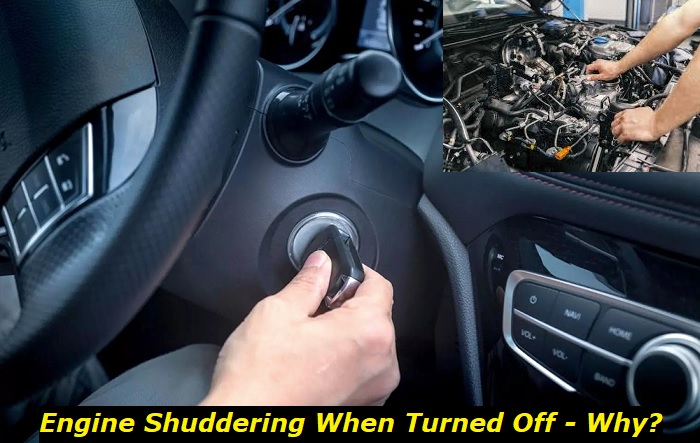If your engine shudders when turning off, it means it still burns fuel when this is not needed. Or maybe engine mounts are worn out and it shakes because of free play. You need to inspect the problem because the shaking engine may lead to serious issues including fatal problems with the machine.
Engine vibrations highlights
- Level of importance:Low
- Commonreasons:Misfiring, engine damage, transmission problems, drive shafts problems
- DIY inspection:Extremely complicated
- DIY repair:Impossible
- Price for repair:$500 - $1,000
- Can you drive?In most cases, yes
- Ways to fix:Only professional repair ispossible,in most cases

Symptoms of the engine that shudders when turning off
Before you start panicking and counting the money left in your pocket for repairs, you should calm down and register all the symptoms. What exactly happens when you turn off the engine? Does it shake in any other cases? Is the vibration in your car more noticeable than it was before?
It's important to register even the smallest details because this will eventually help you solve the problem easily and without a lot of investment.
Here are the symptoms you may pay attention to:
- Does it seem like the engine keeps working for several seconds after you switch it off?
- Is shuddering very intensive or is it just some kind of vibration caused by the engine moving under the hood?
- Is the engine moving? Just put your hands on some metal part of the powerplant and try shaking it.
- Do you hear any metal clunking sounds when the engine shudders after being shut off?
- Do lights on your dash keep blinking when the engine shudders?
- Does this happen every time you shut off the engine or only after a long trip?
- Do you get any warning lights or error messages in your vehicle? Is the check engine light illuminating?
When you answer these questions, it will be much easier for you to locate the actual problem. If you are going to show your car to a mechanic, answers to these questions will spare you time and money. The mechanic will not have to spend hours checking these things on their own. They will just make and check several presumptions.
As a result, understanding what is going on with your car will make the task of repairing it much easier for you. It means you will not need to spend thousands to locate and solve the issue unless it's something very serious.
What are the reasons for your engine shuddering after you turn it off?
Above, I've told you about the symptoms that you need to check. Now, it's time to use that information and solve the problem. For this, you will need to know the actual reason that causes this unpleasant behavior of the engine.
There are several possible reasons you should check for. Here they are:
1. Fuel coming to the combustion chamber
If it seems like your engine keeps working for several seconds after you shut it off, one of the possible culprits is the fuel supply system. It may still send some fuel to the combustion chambers and this causes the fuel to burn. It may be burning thanks to red-hot parts of the engine. Or, for example, carbon buildup may be red hot and cause it to ignite, in the end.
So, the excess fuel will still burn even if the ignition doesn't work. But your task is to understand why fuel comes to the combustion chamber. Usually, this may happen because of the leaking fuel injector or excessive pressure in the fuel supply system.
2. Oil is burning
Another possible reason why the engine may still try to work for several seconds really harshly after it's shut off is the oil. If oil gets into the combustion chamber, it gets burned. Usually, it leads to black smoke from the tailpipe and also to an oil level drop. This is potentially dangerous for the engine, but now you are concerned about the shuddering problem.
So, oil may make the engine work if there is enough oil to burn and move the pistons. Oil shouldn't ever get to the combustion chamber but it can do this due to weak valve seals or worn-out piston rings.
In extremely bad situations, the engine may work at super-high RPM after it is turned off, this is especially common for diesel engines. If oil goes to the combustion chamber through the bad turbocharger, the only way to stop is it to choke it by completely closing the air supply.
3. The engine mount is worn out
After you shut off the engine, it keeps vibrating because of inertia power. But when the engine mounts are OK, you will not feel this in your vehicle. The mounts will compensate for the vibrations and the engine will calm down really quickly.
But what happens when the mounts are not OK? When this happens, you may feel that the engine keeps shuddering for several seconds just because it's not mounted correctly under the hood of your car. It means that the engine will shake and make the car's body shake, too.
This is one of the easiest things to locate because the engine will shake even when you push it with your hands. If this happens with your car, just have the engine mounts inspected and replaced if needed.
4. Ignition anomalies
In a gas engine, there is always some extra gas left in vapors after the engine is shut off. This may be extremely important when there are issues with valves like carbon buildup and the valves don't close completely. The vapors get into the combustion chamber whether you want it or not but they shouldn't be ignited because the engine is off.
Still, the problems with the ignition system may make the spark plug produce the spark for some time after the engine is turned off. It's hard to check but you should inspect the spark plugs and coils when nothing else helps you identify the problem.
5. ECU problems
The ECU controls every aspect of the engine work. It sends the signals to the coils and injectors, controls the position of each piston, and throws codes and warning lights when something is wrong. But when it goes crazy because of overheating or water damage, it can send wrong signals. One of the possible consequences of this is harsh work for several moments after the engine is turned off.
If the ECU is in charge of your problem, this is the worst possible thing. You may try reprogramming the ECU but if it's actually damaged, this won't give any good results. Replacing the ECU is not that easy and will require a lot of professional work.
Can you drive with this problem?
When your engine works for some time after you shut it off, it means that some gasoline or oil is burned or explodes in the combustion chamber. It leads to engine knocking and to improper work of cylinders. This may damage the engine heavily if ignored for a long time.
It doesn't mean that you have to stop your car and never start it again until the problem is solved. If the issues only affect the shut-off stage of driving, you may still drive. But make an appointment in the dealership or repair shop and have a professional mechanic look at the car.
It's important to not ignore the issue as it may lead to unpredictable consequences with the engine. I don't recommend starting and shutting off the vehicle dozens of times after you notice this issue.
DIY solutions and inspection
After you know the actual prices for repair in the dealership, you may decide that DIY inspection is your favorite method to care about your car. But where should you start?
Here's what you may try:
- Shake the engine with your hands. This will help you understand if the mounts are OK.
- Check the coils and spark plugs. At least, look at them and try to spot any difference between them. The plug that looks wrong may actually be the culprit.
- Use the OBD2 scanner. Maybe, you will find several hidden error codes that will explain the problem.
- Check the tailpipe. I mean, you should check the smoke that's coming out. If it's intensive grey or black smoke, your engine requires urgent help.
Unfortunately, not all problems are possible to solve on your own without proper tools and experience. In many cases, you may need to go to a professional mechanic and have your car inspected by them.
Final thoughts
You should understand that the phenomenon when your engine keeps shuddering after the ignition is turned off is not really common. And finding the actual culprit for this may eventually be pretty hard. But thanks to the explanations you may read above, it becomes much easier for you.
Anyway, I always recommend taking your car in for an inspection. Use the inspection opportunities of your dealer but then you may find another place for repairs because dealers take huge amounts of money for labor.
About the authors
The CarAraC research team is composed of seasoned auto mechanics and automotive industry professionals, including individuals with advanced degrees and certifications in their field. Our team members boast prestigious credentials, reflecting their extensive knowledge and skills. These qualifications include: IMI: Institute of the Motor Industry, ASE-Certified Master Automobile Technicians; Coventry University, Graduate of MA in Automotive Journalism; Politecnico di Torino, Italy, MS Automotive Engineering; Ss. Cyril and Methodius University in Skopje, Mechanical University in Skopje; TOC Automotive College; DHA Suffa University, Department of Mechanical Engineering






Add comment